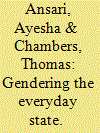|
|
|
Sort Order |
|
|
|
Items / Page
|
|
|
|
|
|
|
| Srl | Item |
| 1 |
ID:
185582


|
|
|
|
|
| Summary/Abstract |
This ethnographic article focuses on interactions between poor Muslim women, various intermediaries/brokers, and the Indian state. The article illustrates the complexities of claim-making and the forms of subjugation/marginalisation Muslim women experience when attempting to access resources, documents or paperwork. Contrary, however, to many representations of Muslim women’s engagements with the state, we also draw out agentive aspects as women hustle and negotiate to make claims and assert citizenship rights. Outcomes are variegated but also incorporate some women in brokerage roles, challenging assumptions regarding state/people mediation in India which foregrounds male brokers. The empirical detail is situated in a theoretical context incorporating gendered distinctions between shifting imaginaries of ‘nation’ and lived experiences of the ‘everyday state’. In a context where ‘nation’ has been evoked and articulated as a feminine form – through evocations of mata (mother) – we show how shifts towards a masculine imaginary, symbolised within Hindu-nationalist discourses, impacts Muslim women’s subjective experiences. We also illustrate that, whilst gendered imaginaries of ‘the nation’ are shifting, the ‘everyday state’ has long been experienced as a masculinised formation. Here we show how embodied involvements with the everyday state were constituted through gendered bureaucratic histories, spatial configurations, urban cosmologies and broader ideologies.
|
|
|
|
|
|
|
|
|
|
|
|
|
|
|
|
| 2 |
ID:
164893


|
|
|
|
|
| Summary/Abstract |
Through ethnographic material gathered in the Muslim woodworking mohallas (neighbourhoods) of a North Indian city, this article attends to ‘performed’ elements of everyday convivial interactions. It builds on work that situates conviviality as a normative project aimed at understanding and fostering interaction within urban space which bridges forms of difference. Through descriptive accounts, the article illustrates how convivial exchanges can embody degrees of instrumentality and conceal relations of power and marginalization that act to silence outrage or contestation. This ‘performed conviviality’ is dealt with in a broader context of ‘scale’ to consider how marginalization and connectedness—the marginal hub—intersect in even the most mundane moments of convivial exchange. By tracing processes of marginalization, boundary making, and bordering within the local, city-wide, state, and international contexts, the article follows the production of a marginalized or ‘border’ subjectivity through to the individual level. The subjectivities produced in this context act to enforce degrees of self-imposed silence among those subjected to processes of marginalization. In addition—and again attending to scale through an acknowledgement of the connected nature of the mohallas—the article also considers the role of conviviality in global chains of supply through the creation and maintenance of bonds and obligations that facilitate production in the city's wood industry.
|
|
|
|
|
|
|
|
|
|
|
|
|
|
|
|
|
|
|
|
|